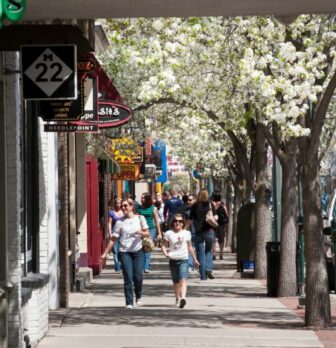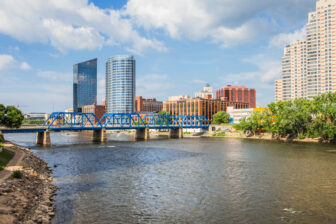My biggest concern for the state and its regions––particularly metro Detroit–is that we have a vision of what we want the future to look like and a public policy agenda, from across the political spectrum, that are grounded in the past––which we can’t go back to–-rather than the future. So we end up not having the debates that we need.
One area where this is particularly true is transit. Particularly rail and bus rapid transit. Across the country––in red and blue states––big metros are investing in light rail and bus rapid transit. Either regions starting from scratch to get in the game or those who have it, expanding. Why? Because they understand that rapid transit is a key ingredient to retaining and attracting young talent. And that young talent is an essential ingredient to future prosperity.
In Michigan there is some recognition in metro Grand Rapids that transit matters, far less so in metro Detroit. At the state level, transit, by and large, is either viewed with hostility or disinterest. Not smart!
Atlantic Cities––which does a great job covering transportation––recently published an in–depth article on the debate in Chicago over a proposed Ashland Avenue bus rapid transit line. What struck me most reading it is that the vigorous debate they are having is completely missing here. And that until that debate is occurring here regularly we are going to be non competitive in retaining and attracting young talent.
The city of Chicago has about 250,000 residents––the second most in the country––25-34 year old with four year degrees. Detroit has 11,000. (The cities of Grand Rapids, Lansing/East Lansing, and Ann Arbor are in the same ball park as Detroit.) An extensive rail transit system is one of the core assets that has made Chicago a talent magnet. You can live there and not own a car, an increasing priority for college educated Millennials.
As Atlantic Cities notes Chicago is not resting on its laurels. They write: “In 2012, shortly after Rahm Emanuel was elected mayor, he and then-Chicago DOT Commissioner Gabe Klein got to work on a progressive transportation agenda that aimed to create 100 miles of protected bike lanes, a number of rail improvements, and a trio of BRT lines.”
Apparently the one controversial part of the expansion plan is the Ashland BRT. Which Atlantic Cities frames as a debate between those in Chicago who are car-oriented and those who are transit friendly. But Atlantic Cities portrays the Ashland BRT debate as about the appropriateness of rapid buses on one non-downtown corridor rather than a debate about the importance of rapid transit to the city’s and regions future. That seems to enjoy near universal support. So Chicago is debating whether or not to add a third bus rapid transit line to a system of more than 100 miles of rail.
That the debate is vigorous––both side well organized and engaged–-is something that doesn’t exist here at all. Where no one has to get organized to defend/support a car orientation. Its simply assumed to be the right answer. And hardly anyone has made the need in our urban centers for an alternative a priority.
In metro Detroit we finally have created a regional transit agency (which is good news), but haven’t funded it. And its Board seems not to share a vision of the central role rapid transit (rail and bus) can and should play in the region’s future.
As with so many other issues, either we get engaged in this debate about what being competitive in the 21st Century requires or we are going to continue to be an economic laggard.






